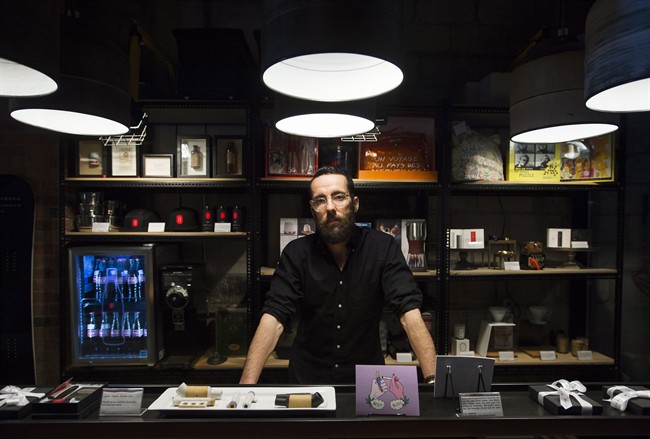TORONTO – You won’t find brightly coloured bongs or bubble gum-flavoured rolling papers displayed against the backdrop of exposed brick and modern, industrial-style furnishings at Tokyo Smoke.

Instead, the shop — located in a former shipping dock nestled between two warehouses in Toronto’s west end — carries high-end pot paraphernalia befitting the pages of a design magazine while also serving up cups of artisanal coffee.
Pipes handcrafted by California-based ceramicist Ben Medansky sit alongside a pricey portable vaporizer, a reimagined version of the French press coffeemaker launched via a Kickstarter campaign and a selection of what shop owner Alan Gertner calls “museum quality collectibles” — items such as vintage Barbies and a vintage Hermes bag.
READ MORE: Why marijuana laws still apply as Ottawa moves to legalization
It’s all part of Gertner’s mission to create a cannabis-friendly lifestyle brand that caters to the urban intellectual — one that breaks the mould of dated weed associations involving video games and junk food.
“I don’t think there is a home for someone who’s buying Mast Brothers chocolate and drinking the nicest coffee to have a similar experience in pot,” says Gertner, who quit his job at Google to launch the brand.
“It’s no different from someone who has beautiful stemware in their home for alcohol. We ritualize and love our experiences, and I think we should have the same thing with cannabis.”
WATCH: Pickering man wants province to reconsider medical marijuana restrictions

The emergence of a luxury cannabis-oriented lifestyle brand like Tokyo Smoke is the latest development in a saga that has seen the purveyors of pot work to reshape popular perceptions of the drug.
Until more recently, those efforts have been aimed at trying to demonstrate the drug’s medical legitimacy.
READ MORE: Ontario bans e-cigarettes, vaporizers where smoking already prohibited
Philippe Lucas, a vice-president at Nanaimo, B.C.-based grower Tilray, says decades of propaganda — including the well-known 1936 flick “Reefer Madness” — have made rebranding marijuana a challenging task.
“I think the stigma is completely understandable when we look at the 70 years of misinformation, propaganda and drug war rhetoric that’s come out of Canada and the U.S.,” says Lucas, who is also the executive director of the Canadian Medical Cannabis Council.
Adding to the difficulty are Health Canada regulations that prevent medical marijuana producers from making health claims in their advertising materials — rules which also apply to the broader pharmaceutical industry.
Canadian cannabis producers have used a variety of strategies to change perceptions about the drug, including moving away from the street names typically used to identify strains.
Mettrum, Bowmanville, Ont.-based grower, uses a colour-coded spectrum — red being the strongest, yellow the mildest — to identify each product’s strength and other characteristics.
READ MORE: Tourist pot use linked to ‘dramatic’ increase in ER visits in Colorado
“We came up with a responsible dialogue for talking about cannabis that doctors would want to use, versus talking about strains like purple kush or super lemon haze,” says Mettrum’s CEO Michael Haines.
Tokyo Smoke doesn’t sell cannabis in Canada yet, but the company is on the cusp of launching a line of four marijuana strains south of the border, titled “Go,” “Relax,” “Relief” and “Balance” — names chosen to appeal to the so-called creative class.
“It’s always funny for me to think of sophisticated intellectuals smoking strawberry-cheesecake branded cannabis,” says Gertner.
Another strategy employed by cannabis producers has been to promote the drug to physicians in a bid to boost patient numbers.
Jordan Sinclair, communications manager at Ontario-based grower Tweed, says that while talking to doctors is important, producers also need to find ways to differentiate themselves from the competition.
One way that Tweed, a subsidiary of Canopy Growth Corp., has set out to do that is by partnering with rapper Snoop Dogg in a deal announced last month.
“There’s lots of different producers in Canada, and we’re all growing a pretty similar product,” says Sinclair. “You want to make sure that people see you as a compelling choice.”
- Gas prices surge in some parts of Canada. What’s causing pain at the pumps?
- Roll Up To Win? Tim Hortons says $55K boat win email was ‘human error’
- Ontario premier calls cost of gas ‘absolutely disgusting,’ raises price-gouging concerns
- Netflix beats subscriber targets, but revenue falls short of forecast



Comments